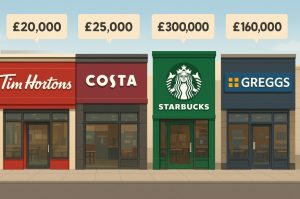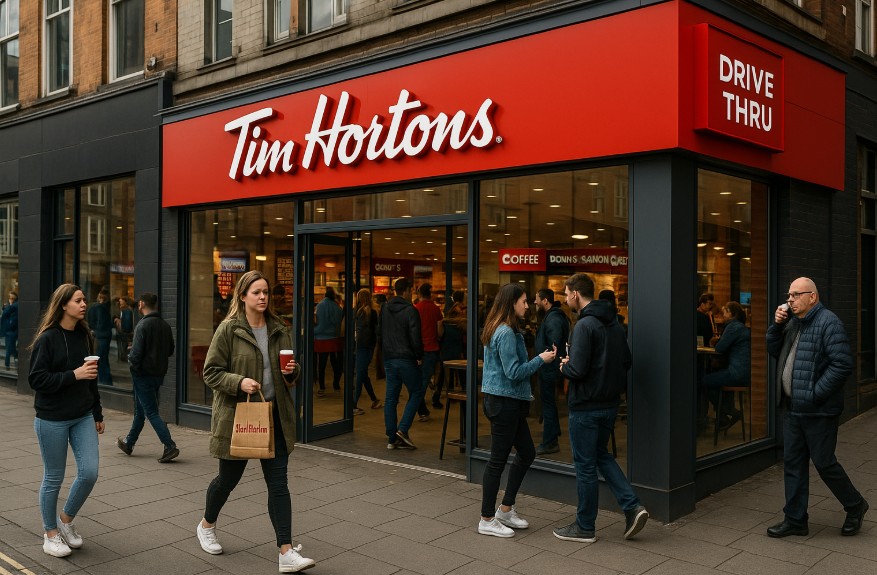Tim Hortons, a brand synonymous with coffee and baked goods, has grown into a global icon. With over 75 restaurants across the UK and a well-established business model, it presents a compelling opportunity for aspiring franchisees.
But how much does it really cost to open a Tim Hortons in the UK? What are the potential returns? This comprehensive guide explores the costs, investment breakdown, and profit potential associated with a Tim Hortons franchise in the UK.
About Tim Hortons

With over 75 restaurants now operating across the United Kingdom, Tim Hortons has rapidly established itself as one of the fastest growing food service retailers in the region. The brand’s expansion in the UK is a testament to its global appeal and a proven business model that continues to deliver consistent growth.
Whether located in bustling city centres or suburban high streets, each Tim Hortons restaurant offers customers a welcoming space to enjoy premium coffee, freshly prepared food, and signature baked goods.
For entrepreneurs seeking to invest in a high-growth franchise opportunity, Tim Hortons offers the ideal environment to thrive. The company supports franchisees with training, marketing, and operational guidance to ensure long-term success.
Individuals with a strong work ethic, appetite for business ownership, and the determination to build a lasting enterprise will find Tim Hortons a rewarding opportunity.
A Look at the Tim Hortons Legacy
Founded in 1964 by Tim Horton, a Canadian National Hockey League legend, the first restaurant opened its doors in Hamilton, Ontario, Canada. What began as a single coffee and doughnut shop quickly grew into an iconic Canadian brand, known for its community connection and customer loyalty.
Key Milestones in Tim Hortons History
| Decade | Milestone |
| 1960s | Tim Hortons opens the first store in Hamilton, Ontario in 1964 |
| 1970s | The famous Timbit is introduced in 1976, becoming a cultural favourite |
| 1990s | The Iced Cappuccino launches in 1999, marking a new era of cold beverages |
| 2000s | The 2000th location opens in Toronto in 2000; “Double Double” added to the Oxford Dictionary in 2004 |
| 2010s | In 2017, Tim Hortons enters the UK market, bringing its Canadian charm with it |
Since arriving in the UK in 2017, the brand has become increasingly popular with British consumers, offering everything from breakfast wraps and doughnuts to premium brewed coffee and iced favourites. The menu is carefully adapted to the UK market, while staying true to the essence of the original Canadian experience.
Today, Tim Hortons is more than just a coffee shop. It is a globally recognised brand built on the foundation of quality, community, and consistency.
With strategic expansion plans and a supportive franchise system, the company remains committed to growing its UK footprint while delivering the same warmth and hospitality it has been known for since 1964.
What Is The Total Initial Investment Required To Open A Tim Hortons Franchise In The UK?
Starting a Tim Hortons franchise in the UK demands a significant upfront investment. The total initial cost varies depending on location, the size of the unit, and whether it’s a drive-thru, high-street, or shopping centre location. On average, investors should expect to spend between £150,000 and £500,000.
This total investment includes the franchise fee, build-out expenses, equipment, and working capital required to maintain operations in the initial months.
| Cost Category | Estimated Cost Range (£) |
| Franchise Fee | 20,000 – 50,000 |
| Equipment and Fit-Out | 100,000 – 300,000 |
| Leasehold Improvements | 30,000 – 70,000 |
| Working Capital | 20,000 – 50,000 |
| Marketing and Pre-Launch | 10,000 – 20,000 |
| Legal and Licensing | 5,000 – 10,000 |
| Total Estimated Cost | 150,000 – 500,000 |
These figures provide a rough idea of the financial commitment required, although actual costs can vary based on regional property values, construction needs, and operational setup.
How Much Is The Tim Hortons Franchise Fee In The UK?

The franchise fee grants the investor the rights to operate under the Tim Hortons brand, utilise their business systems, and receive initial training and support. In the UK, this fee typically falls between £20,000 and £50,000.
This one-time payment is a critical part of the investment and often depends on the format and territory size. Once paid, the franchisee is eligible to enter a formal agreement and begin the setup process with assistance from the corporate team.
What Are The Equipment And Build-Out Costs For A Tim Hortons Franchise?
Outfitting a Tim Hortons restaurant requires a substantial investment in both equipment and store design. These costs vary significantly depending on whether the location is a new construction or a refurbishment of an existing site.
Common build-out requirements include:
- Commercial kitchen equipment
- Coffee machines and refrigeration units
- Digital menu boards and tills
- Custom counters and seating
- Indoor and outdoor signage
- Fixtures and plumbing work
The estimated cost for equipment and fit-out generally ranges between £100,000 and £300,000. Larger stores or drive-thru formats will typically fall at the higher end of this range. Additionally, franchisees may incur site preparation costs and health and safety compliance modifications based on the local council’s regulations.
What Operational Expenses Should Franchisees Anticipate?
After the initial setup, franchisees must manage ongoing operational costs to sustain the business. These expenses are critical to running a successful outlet and include both fixed and variable costs. Proper financial planning for these expenses is essential for long-term profitability.
The main operational costs include:
- Rent or lease payments depending on location
- Salaries and wages for staff
- Utility bills such as electricity, gas, and water
- Regular inventory purchases
- Maintenance and repairs
- Ongoing marketing and promotional expenses
- Insurance and local council business rates
| Operational Cost Type | Monthly Estimate (£) |
| Rent and Utilities | 5,000 – 12,000 |
| Payroll | 8,000 – 20,000 |
| Inventory | 7,000 – 15,000 |
| Marketing and Local Ads | 1,000 – 3,000 |
| Insurance and Miscellaneous | 1,000 – 2,500 |
These figures represent averages and are subject to change based on the store’s size, city or region, and customer volume.
What Does The Application And Approval Process Involve?

The journey to opening a Tim Hortons franchise in the UK involves a detailed multi-stage process. Interested investors must be prepared to undergo financial and background evaluations before being accepted as franchisees.
The process includes:
- Submission of an initial enquiry and business profile
- Financial screening to assess capital availability and creditworthiness
- Review of business experience or relevant industry background
- Discovery day and interview with the Tim Hortons development team
- Signing of franchise disclosure documents and agreements
- Site approval and lease negotiation
- Pre-opening support, training, and marketing preparations
Franchisees also undergo an extensive training programme designed to familiarise them with operations, quality control, food safety, and customer service expectations. This training is essential to ensure uniform standards across all locations.
How Profitable Is A Tim Hortons Franchise In The UK?
Profitability is one of the most important considerations for any prospective franchisee, and Tim Hortons presents an attractive opportunity in this regard.
While individual results can vary depending on several factors—including location, operational efficiency, and market saturation—Tim Hortons has demonstrated strong commercial potential in the UK’s competitive food service sector.
A well-run Tim Hortons location can generate annual gross revenues ranging from £500,000 to £1 million, with some high-traffic stores exceeding this range.
Factors that significantly influence top-line revenue include footfall, the quality of customer service, the location’s accessibility, and local marketing effectiveness.
On the cost side, franchisees should expect to incur:
- Royalty fees of approximately 6% to 8% of gross sales
- Marketing contributions that typically range between 2% and 4% of gross sales
- Labour costs, which can account for 25% to 35% of revenue depending on staffing structure
- Food and packaging costs, usually between 25% and 30% of gross revenue
- Operational overheads such as rent, utilities, insurance, and repairs
Once these costs are accounted for, the typical net profit margin for a well-performing Tim Hortons store is estimated to be between 10% and 20%, resulting in annual net earnings of £75,000 to £150,000.
The return on investment (ROI) period for a new franchise generally ranges from two to four years, depending on the initial setup costs and early performance. Multi-unit operators may accelerate ROI through shared staffing, centralised administration, and reduced per-unit operating costs.
While profitability is not guaranteed, franchisees who demonstrate strong leadership, financial control, and customer service focus are more likely to reach and exceed average industry performance levels.
What Kind Of Support Does Tim Hortons Provide To UK Franchisees?
One of the most compelling aspects of becoming a Tim Hortons franchisee is the robust support infrastructure offered by the franchisor. From pre-opening preparations to ongoing operations, franchisees benefit from a range of services designed to facilitate business success and maintain brand consistency across the UK.
Pre-Opening Support
Tim Hortons provides detailed guidance during the setup process, including:
- Site selection assistance based on market analysis and demographic research
- Design and layout support to ensure each outlet reflects the brand’s identity
- Access to preferred contractors and suppliers to streamline build-out and procurement
- Comprehensive initial training for franchisees and key staff in areas such as food preparation, customer service, equipment operation, and health and safety
This hands-on involvement helps new franchisees navigate the complexities of setting up a retail food outlet, ensuring they are ready for launch with minimal delays.
Operational Training and Resources
Once the location is open, franchisees benefit from:
- Ongoing operational support from regional business consultants who offer guidance on performance improvement, cost control, and staff management
- Marketing and advertising support, including national campaigns, promotional material, and seasonal menus tailored to the UK market
- A centralised supply chain that ensures quality, consistency, and competitive pricing for core ingredients, packaging, and branded merchandise
- Technology tools such as point-of-sale systems, inventory management software, and reporting dashboards that help track sales and profitability in real-time
Tim Hortons also provides a detailed operations manual, which serves as a reference for all standard operating procedures, customer service expectations, and food quality standards.
Performance Monitoring and Quality Assurance
The brand maintains strict quality control and performance monitoring protocols. Franchisees are subject to:
- Regular site visits and audits from field consultants
- Guest experience evaluations to maintain customer satisfaction
- Benchmarking reports that compare store performance against national averages
- Feedback and improvement plans tailored to individual franchise locations
This structured support helps franchisees align with the broader brand vision while achieving operational excellence at the local level.
Community and Network Engagement
Tim Hortons fosters a culture of collaboration and knowledge sharing among its franchise network. UK franchisees have access to:
- Annual franchisee conferences and regional meetings
- Workshops and webinars focused on new product launches, marketing strategies, and business development
- Peer networking opportunities to share best practices and build relationships with other owners
This collective environment empowers franchisees to continuously improve and remain competitive in a fast-moving market.
In summary, Tim Hortons offers a comprehensive support package that significantly lowers the barriers to entry for new franchisees and enhances long-term sustainability for established operators. The brand’s commitment to training, marketing, operations, and innovation ensures that every UK franchisee is well-equipped to build a successful business under the Tim Hortons banner.
What Are The Risks And Challenges Of Owning A Tim Hortons Franchise?

Although the business model is proven, there are notable risks associated with investing in any franchise, including Tim Hortons. High initial investment and operational complexity are two of the most prominent concerns for prospective franchisees.
Challenges to consider:
- Need for significant financial capital and long-term commitment
- Competitive landscape with established brands in the UK
- Ongoing management responsibilities, including recruitment and training
- Local market saturation in major cities
- Vulnerability to economic downturns and inflation affecting operating costs
Franchisees who approach the opportunity with a clear financial strategy, operational readiness, and a strong team can mitigate many of these risks. However, success will depend heavily on commitment, execution, and understanding the brand’s values and customer expectations.
Comparing To Other Similar Franchise Opportunities
For entrepreneurs considering an investment in the UK’s competitive fast food and café franchise sector, it’s essential to assess how Tim Hortons compares to other well-known brands.
While names like Costa Coffee, Greggs, Starbucks, and Pret A Manger dominate the market, Tim Hortons offers a distinct proposition that stands out in both cost structure and growth potential.
Market Positioning
Tim Hortons occupies a unique space as a hybrid between a coffee shop and a quick-service restaurant (QSR). While brands like Starbucks focus heavily on beverages and Pret A Manger leans toward grab-and-go health-conscious meals, Tim Hortons delivers a more balanced offering:
- Freshly brewed coffee and iced beverages
- Breakfast, lunch, and snack options
- Sweet baked goods including doughnuts and Timbits
- Value-focused meal deals throughout the day
This diversity helps drive consistent footfall across all dayparts, improving revenue potential compared to single-format cafés or limited menus.
Investment And Franchise Cost Comparison

Here is a general comparison of the initial franchise costs between Tim Hortons and other popular UK food service franchises:
| Franchise Brand | Estimated Initial Investment (£) | Franchise Fee (£) | Typical Format |
| Tim Hortons | 150,000 – 500,000 | 20,000 – 50,000 | Drive-thru / Café |
| Costa Coffee | 250,000 – 800,000 | 32,000+ | Café / Kiosk |
| Greggs | 260,000 – 390,000 (franchise pilot) | Varies (by location) | High-street Bakery |
| Starbucks (UK) | 500,000 – 1 million+ | 25,000 – 40,000 | Café |
Tim Hortons offers an attractive middle ground with moderate investment requirements and the potential for multi-format expansion, including drive-thru locations which many other competitors do not widely offer in the UK.
Brand Recognition And Growth Trajectory
While Starbucks and Costa Coffee enjoy high brand recognition, Tim Hortons is rapidly gaining awareness in the UK, driven by its North American heritage and strategic marketing.
The company is actively expanding with over 75 stores already opened, and franchise territories are still available, making it a strong option for early movers.
Support And Training
Tim Hortons provides:
- Comprehensive training programmes
- Site selection support
- Operational and marketing assistance
- Ongoing franchisee development resources
Compared to newer or more corporate-focused brands (e.g., Pret A Manger), Tim Hortons offers a clear franchising pathway backed by systems that have scaled globally.
Profit Potential And Flexibility
The combination of multiple revenue streams (coffee, food, desserts), extended operating hours, and flexible store formats allows Tim Hortons franchisees to adapt to a wide variety of locations and customer demographics. This sets it apart from bakery-only or beverage-centric competitors.
Conclusion
A Tim Hortons franchise offers a solid opportunity for those looking to enter the UK’s dynamic food service market.
With strong brand recognition, a proven business model, and corporate support, it appeals to experienced entrepreneurs and first-time investors alike.
However, success is not guaranteed. Prospective franchisees must thoroughly evaluate the total costs, expected profits, and operational demands before proceeding.
For those ready to commit both financially and operationally, Tim Hortons presents one of the more robust franchise options available in the UK today.
FAQs
What is the ongoing royalty fee for a Tim Hortons franchise in the UK?
Tim Hortons typically charges a royalty fee of around 6–8% of gross sales. This fee supports ongoing brand management, marketing, and corporate services.
Are there any marketing contributions required from franchisees?
Yes, franchisees are generally required to contribute to a marketing fund, which may range from 2–4% of gross sales. This supports both national and local advertising campaigns.
Can a franchisee own multiple Tim Hortons locations?
Yes, multi-unit franchising is possible. In fact, Tim Hortons encourages qualified investors to develop multiple units across agreed territories.
How long does it take to open a Tim Hortons franchise from application to launch?
The timeline varies, but typically it takes between 6 to 12 months to go from initial application to store opening, depending on location readiness and legal procedures.
Is restaurant or food industry experience necessary to own a Tim Hortons franchise?
While prior food industry experience is beneficial, it is not strictly necessary. Tim Hortons offers comprehensive training and support to ensure franchisees are well-prepared.
Are there financing options available for new franchisees?
Tim Hortons does not directly provide financing but may have relationships with lenders who understand the brand and franchise model.
How does Tim Hortons help in selecting a location?
Tim Hortons provides market analysis and real estate support to help identify high-potential locations, ensuring alignment with the brand’s strategic goals.
Related Articles:








